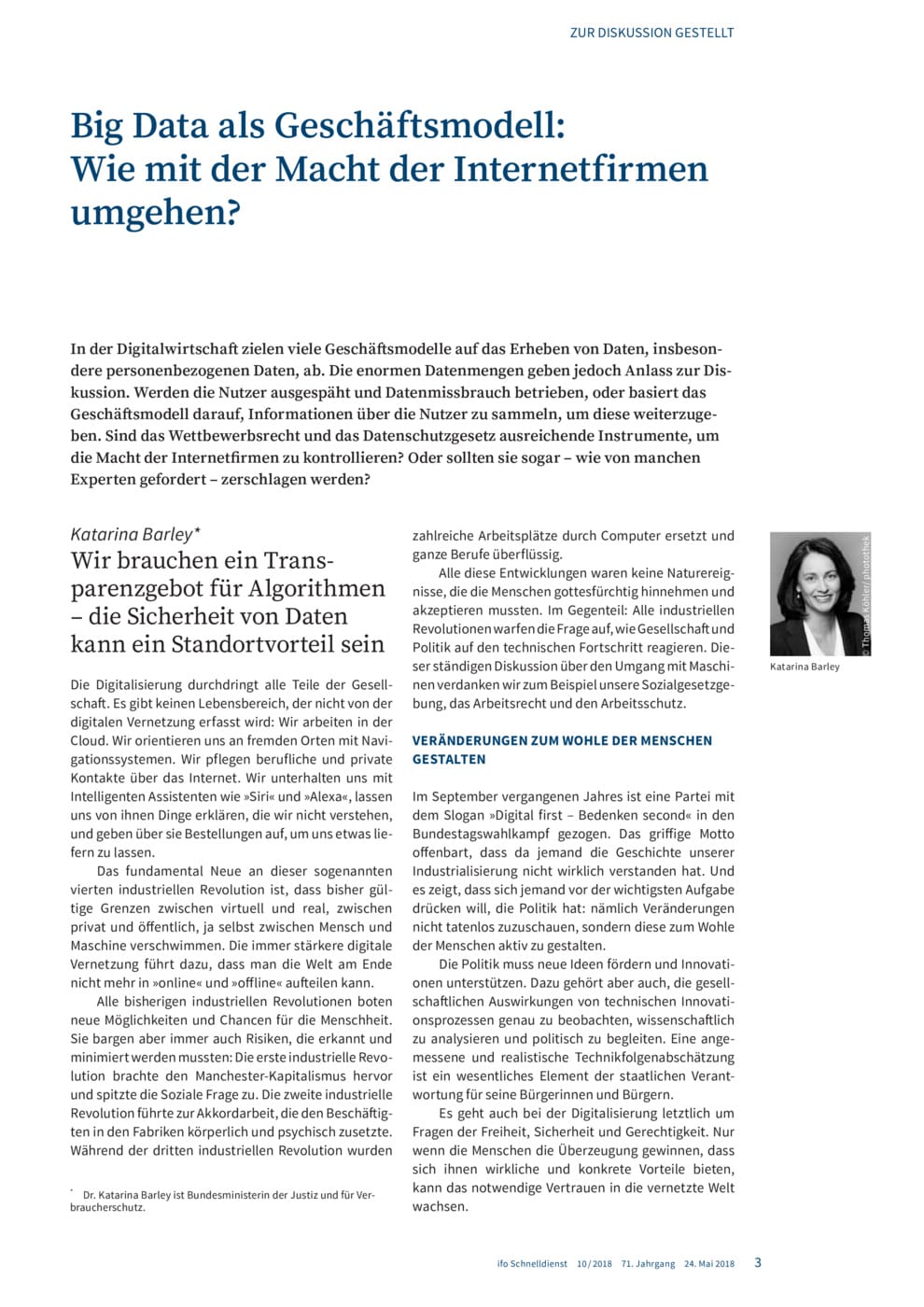Big Data as a Business Model: How Should we Deal with the Power of Internet Companies?
ifo Institut, München, 2018
ifo Schnelldienst, 2018, 71, Nr. 10, 03-21

In the digital economy, many business models target the collection of data, especially personal data. The enormous amounts of data collected, however, give cause for concern. Are users being are spied upon and is their data being misused, or is the business model based on gathering information about the users in order to share the data with others? Are competition and data protection laws sufficient tools for controlling the power of Internet companies? Or should they – as some experts demand – be broken up? According to Katarina Barley, Federal Minister of Justice and Consumer Protection, a transparency requirement for algorithms is needed. The development of digitalisation requires a reliable regulatory framework that includes scope for innovation but also provides a means of preventing data misuse, fraud and discrimination. In addition, a “Corporate Digital Responsibility” is needed. A country that can assure data security would have a location advantage. According to Achim Wambach, Monopolies Commission and ZEW, Mannheim, big data offer significant benefits for consumers – from individualised services to more targeted advertising. For this reason, the use of data as a business model should be allowed also in the future and innovations should be promoted. However, this must be accompanied by a pro-competitive regulatory policy, by data protection requirements and by competition instruments that effectively sanction market abuse. A break-up or divestiture of Internet companies would be too drastic an intervention in the market economy and in the rights of the companies concerned, which is why it is currently not an option. Ralf Dewenter, Helmut Schmidt University Hamburg, observes that the data are not only part of some business models but that many business models are inextricably linked to the collection and use of data. Requiring companies to forego data collection is thus neither realistic nor practicable. Interfering with the structure of business models implies that product quality and innovation activity would be affected. Part of the problem is due to the market power of Internet platforms, another part is because of data protection aspects. An important element that is relevant to both competition and data protection is transparency in the use of data, which is one way of reducing information asymmetries. Christian Hildebrandt, WIK GmbH, Bad Honnef, argues that an ongoing systematic market observation of Internet platforms is a suitable and appropriate instrument for competition and regulatory authorities. The initial goal is to combine a sufficient information base with a well-founded state of knowledge. Hamidreza Hosseini, ECODYNAMICS, and Holger Schmidt, Digital Economist, propose that companies adopt an implementation-oriented data strategy as part of their corporate strategy that determines the opportunities for the internal use and handling of data. For the external use of data, it is necessary to define topics such as customer acceptance. Peter Buxmann, Darmstadt University of Technology, points to the tension between the value of data for businesses, on the one hand, and the privacy concerns of users, on the other: providers can develop lucrative business models based on data, and users pay for the services they provide, in part by surrendering their privacy, although most customers are not happy with the deal of service in exchange for data. However, due to the potentially high value of data for business and society, it makes no sense to ban data-based business models. However, more attention should be paid to the fairness of the offers involved. Among other things, providers should be required to offer more transparency regarding the data collected from the users as well as regarding the processing or dissemination of these data.